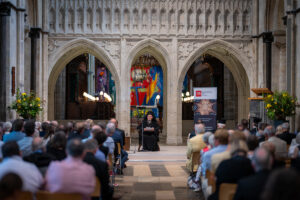Greeting of His All-Holiness on the occasion of the World Greek Language Day
The catalytic effect of the Greek language on world culture and its expressive power was discussed by His All-Holiness Ecumenical Patriarch Bartholomew in a recorded greeting which was broadcast during the online event “Seferis – Elytis: from Greece to the World.” The event was organized by the Consulate General of Greece in Istanbul, today, February 9, 2021, World Greek Language Day.
“Greek rightly claims the title of ‘mother tongue of the spirit.’ If what is ‘classic’ is what reflects the common pursuits of people, and exceeds the limits of the culture in which it was created, then the Greek language is truly classical, ‘the property of humanity,’” His All-Holiness pointed out, among other things.
Following is the full text of the Greeting of His All-Holiness the Ecumenical Patriarch for World Greek Language Day:
Your Excellency the Consul General of Greece in Istanbul,
Your Excellency, Training Coordinator,
Dear participants in this online event,
Among the many changes that the pandemic has brought to our lives is the introduction of online communication. Therefore, even today, on World Greek Language Day, which is dedicated this year to the two Nobel Prize-winning Greek poets, Giorgos Seferis and Odysseas Elytis, on the occasion of two anniversaries, the fiftieth anniversary of the death of the first and the 110th anniversary of the birth of the second, we address you via the internet. We congratulate the organizers and wish them success with this great event.
Greek, the language of Homer and Sappho, of the dramatists and the philosophers, of Aristophanes and Thucydides, of the New Testament and the Fathers of the Church, of divine worship and hymnology, is a singular language among the 2700 languages of the world. The key concepts of world culture are Greek: speech, dialogue, democracy, ethics, politics, music, physics, history, pedagogy, theory, practice, anthropology and countless others.
A language expresses the identity and the quality of the culture to which it belongs. It is not simply a means of communication, but “a bearer of moral values,” as Elytis notes. Indeed, an entire civilization passes through language. The pre-eminent “philosophical language,” Greek, primarily names the essence, the being, the dimension of the depth of things, and not their utility. Very important works of the human intellect have been written in Greek. It has been said that the philosophers, wherever they are on the earth, “think in Greek,” and that whoever speaks Greek finds it “almost impossible not to be a philosopher.”
We add that it is impossible for those who speak the Greek language not to theologize. It is no coincidence that Greek has become the axial language of Christian theology. Thanks to the Greek language, a philosophical and theological feat was achieved, the “innovation of names,” the authentic expression of the experience of salvation in Christ, with the terminology of Greek philosophy. This combination of Hellenism and Christianity was a defining moment, not only in the evolution of philosophy and theology, but also, more generally, in the history of civilization.
Greek rightly claims the title of “mother tongue of the spirit.” If what is “classic” is what reflects the common pursuits of people, and exceeds the limits of the culture in which it was created, then the Greek language is truly classical, “the property of humanity.”
In this sense, it is not surprising that the cultural identity and identity of our Genos are composed of the Greek language and the Orthodox faith, in their essential interdependence. “Only through our faith and language have we been saved up to today, and only through these two will we be saved tomorrow,” writes Zisimos Lorentzatos.
Dear friends,
Today we pay tribute to the Greek language, to its great contribution to world culture, to letters and sciences, to democracy and communication. And we honor our two great poets, Seferis and Elytis, for their work, their poetry, their translation, their wonderful essays, their special presence in the spiritual life, the peerless beauty of their speech. They contributed to the emergence of the expressive power of the modern Greek language, a language that is “alive, loving, persevering and graceful,” as Seferis wrote, “the daughter of a great generation.” All this applies apart from the “contrived polarization” between ancient and modern Greek, since a language must be nourished by its roots, “the roots of the thousands of preceding years.” “After 3000 years,” notes Elytis, “the language of the people is the language of the land, which continues to speak the same language, in the sense that even the least literate, the salesman and the baker, continues to say ton ourano ourano and tin thalassa thalassa [‘the sky, the sky,’ and ‘the sea, the sea’].”
In the modern world of technocracy, economism, numbers and quantitative criteria, our poets have a say in the incomparable values of our tradition, for Europe, for culture, for art, which magnifies the mystery of the world, and sharpens the sense of beauty and the truth of things.
In his address upon receiving the Nobel Prize in Literature in Stockholm on December 10, 1979, Odysseas Elytis reminded the audience that in the history of the Greek language, “In the span of twenty-five centuries, there was never one in which poetry was not written.” He added meaningfully: “What becomes of poetry? What does it represent in such a society? This is what I reply: poetry is the only place in which the power of numbers proves to be nothing.”
With these thoughts in mind, we once again commend all those who took the initiative in today’s online event and the responsibility for its realization, and we wish all of you who are participating all the blessings of God.







